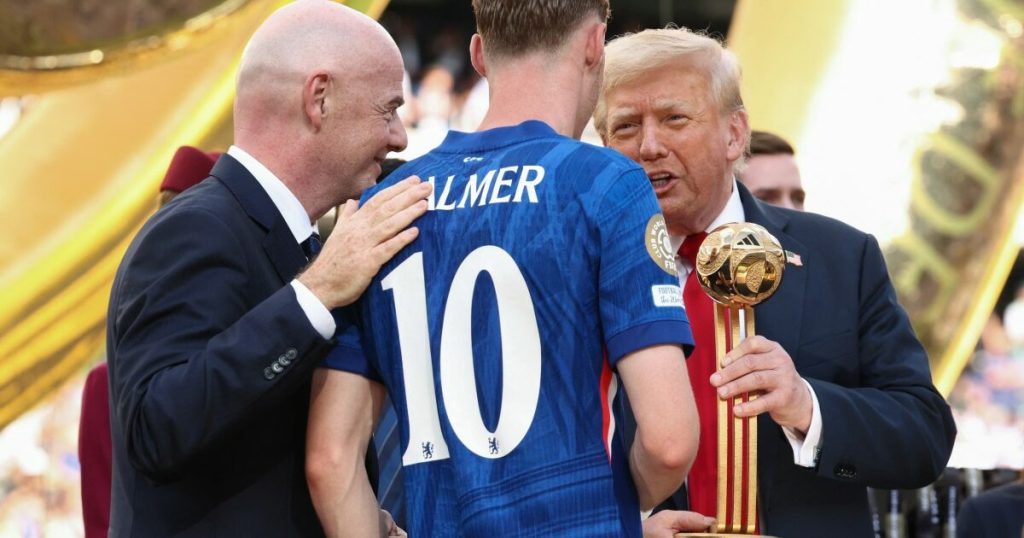Donald Trump’s presence at the FIFA Club World Cup final was a study in contrasts, marked by both enthusiastic celebration and audible disapproval. While he reveled in the victory of Chelsea, beaming and joining the team’s jubilant trophy presentation, his arrival on the pitch was met with a chorus of boos that momentarily overshadowed the cheers. This mixed reception underscored the polarizing nature of his presidency and the complex relationship he has cultivated with the world of sports. Despite the vocal dissent, Trump appeared undeterred, enthusiastically participating in the award ceremony and presenting trophies to both the victorious Chelsea players and the runners-up, Paris Saint-Germain. This marked a significant moment for the president, occurring on the first anniversary of an assassination attempt he survived during a campaign rally.
The Club World Cup final served as a platform for Trump to showcase his vision of a “Golden Age of America,” a theme he intends to further emphasize during the 2026 World Cup, which the United States will co-host with Canada and Mexico. The upcoming World Cup holds particular significance as it coincides with the 250th anniversary of American independence, providing a symbolic backdrop for Trump’s nationalistic agenda. He has established a dedicated White House task force to ensure the smooth execution of the tournament, highlighting its importance within his political strategy. His appearance at the Club World Cup final, therefore, can be seen as a precursor to his broader plans for leveraging the 2026 World Cup to promote his political narrative and project an image of American strength and prosperity on the global stage.
Trump’s involvement in the world of football extends beyond mere symbolic gestures. He has cultivated a close relationship with FIFA President Gianni Infantino, a frequent visitor to the White House. This connection is evident in Trump’s prominent display of the Club World Cup trophy in the Oval Office, a gesture that underscores the importance he assigns to his relationship with FIFA and the sport itself. Infantino, known for his diplomatic skills in navigating interactions with world leaders, has publicly praised Trump’s support for both the Club World Cup and the upcoming 2026 World Cup, emphasizing the president’s understanding of their significance. This mutual admiration and strategic alliance further solidify Trump’s engagement with football and suggest a deeper political calculation at play.
Beyond political strategy, Trump’s interest in football appears to have a personal dimension. Infantino has highlighted the influence of Trump’s son, Barron, a football enthusiast, suggesting that the president’s affinity for the sport is partly rooted in his desire to connect with his son. This familial connection adds another layer to Trump’s engagement with football, portraying it as not solely driven by political motivations but also influenced by personal interests. Furthermore, reports of Trump’s own experience playing football during his time at the New York Military Academy provide a historical context for his current involvement, suggesting a long-standing, if perhaps dormant, connection to the sport.
However, Trump’s foray into the world of football has not been without controversy. His outspoken nature and tendency to inject political rhetoric into sporting contexts have sparked criticism and debate. An instance of this occurred during a meeting with Juventus players at the Oval Office, where he initiated a discussion about transgender athletes in sports, a topic known to be divisive and politically charged. This incident highlighted Trump’s propensity to blur the lines between sports and politics, a characteristic that has marked his presidency and often generated controversy. Such actions raise questions about the appropriateness of using sporting platforms for political discourse and the potential impact on the athletes and the sport itself.
Furthermore, Trump’s hardline immigration policies, a cornerstone of his “America First” agenda, have raised concerns about potential negative repercussions for the 2026 World Cup. Statements from Vice President JD Vance emphasizing the temporary nature of visitors’ stays in the United States for the tournament have fueled these anxieties, potentially discouraging international fans from attending. This creates a tension between the desire to showcase American prowess through hosting a major international sporting event and the potential alienating effects of restrictive immigration policies. The confluence of these factors highlights the complex and often contradictory nature of Trump’s relationship with football, where political ambitions, personal interests, and controversial policies intersect.


